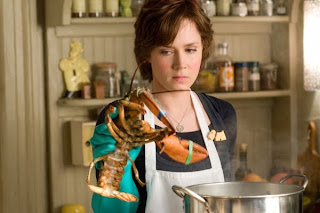 At home, in the kitchen, her husband Eric (Chris Messina) playfully dances around her singing “lobster killer” in a high-pitched voice (while the Talking Heads’ “Psychokiller” is heard in the background). Julie contemplates following Julia’s advice to stab the lobsters in the head prior to boiling, but just can’t get herself to do it. Finally she takes heart, scoops up the three crustaceans, dumps them in the bubbling pot one by one, then slams down the lid. A smile slowly spreads across her face when she realizes she’s done it… but then one of the lobsters in his death throws manages to pop up the lid—and Julie flees the room, shrieking hysterically. Luckily, Eric is there to take over, deftly reassembling the lobster death spa as he mutters, “Sorry boys—there’s a new sheriff in town.”
At home, in the kitchen, her husband Eric (Chris Messina) playfully dances around her singing “lobster killer” in a high-pitched voice (while the Talking Heads’ “Psychokiller” is heard in the background). Julie contemplates following Julia’s advice to stab the lobsters in the head prior to boiling, but just can’t get herself to do it. Finally she takes heart, scoops up the three crustaceans, dumps them in the bubbling pot one by one, then slams down the lid. A smile slowly spreads across her face when she realizes she’s done it… but then one of the lobsters in his death throws manages to pop up the lid—and Julie flees the room, shrieking hysterically. Luckily, Eric is there to take over, deftly reassembling the lobster death spa as he mutters, “Sorry boys—there’s a new sheriff in town.”The scene is played for laughs—not exactly an original concept; after all, Woody Allen’s Annie Hall (1977) famously features a comedic live-lobster-boiling scene. Only here, the protagonist couple’s mutual incompetence in accomplishing the feat is arguably something that brings them closer together. Ephron’s film is a little more on the reactionary side, presenting Julie’s momentary second thoughts as a sign of feminine weakness.
More than that, Eric’s actions are presented as evidence of his “saintliness” in contrast to Julie’s “bitchiness” and general self-involvement. (Coincidentally, we find out in a conversation between Julie and her closest female friend [Mary Lynn Rajskub] that essentially all women are bitches—except for Julia Child. And unlike Julia, Julie becomes worthy of her saintly husband only after realizing the extent of her shortcomings and publicly apologizing for them in her blog.) Overcoming her foolish squeamishness is something Julie must achieve in order to pave the way to self-actualization; Eric understands this even before she herself does. And his coming to her rescue in such a manly way thus fulfills a part of her mission that would otherwise be left unfulfilled.
But perhaps the most important thing to take home from the lobster-boiling sequence—in a film praised by moviegoers in large part for its tantalizing food pornography—is that culinary professionalism and foodie interests trump compassion 100% of the time. The ensuing feast Julie prepares for her friends is after all one of her greatest gastronomic accomplishments, and once everyone is sitting at the table, moaning over the deliciousness of the lobster carcasses, all is once again right with the world.
No comments:
Post a Comment